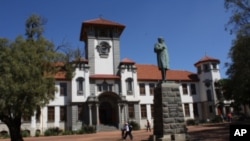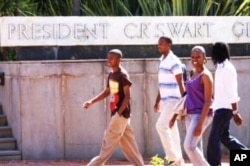He’s a recent Fulbright Scholar at one of the world’s top universities, Stanford in the United States, where he also completed his PhD. He’s received an honorary doctorate in education from the University of Edinburgh. He’s the author of several books on race and education. He’s regarded as one of Africa’s eminent thinkers.
With these qualifications, lucrative offers from leading international institutions seeking Professor Jonathan Jansen’s services continue to pour in. But he chooses to stay in South Africa to lead a university perceived as one of the “last outposts” of racism in the country. He’s the first black dean of the University of the Free State (UFS) in its 105-year history.
When asked why he’s doing this, he smiles. “Because I like trouble,” he says slowly. “I’ve worked in very, very difficult universities – much more complex and much more dangerous than the University of Free State can ever be…. I hope (it) doesn’t sound arrogant but I don’t feel pressure. What I feel is an enormously exciting challenge.”
At UFS, Jansen has found exactly that.
Integrating students
Fifteen years after apartheid officially ended, separate residences for black and white students on the campus were still the order of the day. Protests and race riots rocked the university regularly. Into this cauldron stepped Jansen, making friends and enemies in equal measure as he forced students of different races to live and study together.
He joined UFS in the aftermath of an incident that once again threw up the specter of violent racial conflict in South Africa. Two years ago video footage of four white male UFS students humiliating some middle-aged black campus cleaners was broadcast around the world. During a mock initiation ceremony, the young men instructed the cleaners – mostly women – to eat food into which it appeared one of the students had urinated.
The alleged offenders are being tried for various crimes. But Jansen reignited tension at UFS, and across South Africa, when he recently announced that he was willing to welcome them back on the campus if they wished to resume their studies.
Powerful members of South Africa’s ruling ANC party, who had initially lauded Jansen’s appointment, called for his dismissal. The leader of the ANC Youth League in the Free State province said Jansen should be “shot and killed, because he is a racist” and a “criminal.”
Yet the dean has remained unfazed. “Racial reconciliation is part of a university’s mandate,” he insists. “To think that going to university is only about getting a degree is ignorant.”
Conservative epicenter
Jansen acknowledges, though, that he has “no magic bullet” to end racial prejudice at UFS. “We have serious problems with racism that breaks out on a fairly regular basis on our campus,” he tells VOA.
The university’s situated in South Africa’s farming heartland, known for its conservatism. “This is rural South Africa so there’s one or two crazies around and they write to me…. It’s normally very thick, racist stuff,” Jansen says. Despite these attempts at intimidation, he has “desegregated” university residences. “I will not tolerate black and white students living separately on my campus,” he says.
But he’s not celebrating yet. Jansen says, “We have cohabitation in our residences, but we don’t have true racial integration.” Many students, and especially whites, continue to resist living and learning together, arguing that there will be problems because of their diverse backgrounds.
The Freedom Front Plus (FF+), a political party with white, Afrikaans membership, maintains a strong presence at UFS. It says integration should be “natural” and students of different races shouldn’t be forced to live together if they don’t want to. FF+ supporters often highlight “cultural differences” between white and black South Africans that lead to conflict. They say, for example, that black students are “naturally louder” than white students, making it impossible for white students to study.
Jansen responds, “The FF+ guys are seriously racist in their orientation to the world. And that racism plays out in such ridiculous statements that blacks are loud and whites are (not). Have you ever been on a white residence on this campus? They’re probably all black by that criterion!” he says, and adds, “The entire logic of apartheid was based on cultural differences – and look at where it got us….”
The FF+ insists it’s not racist, but is committed to “fighting for minority rights.”
Tears and aggression
Jansen maintains there must be a certain amount of duress involved in ensuring that South African students of different races mix. He says there are “as much cultural differences within the white Afrikaans-speaking community as between any other group – but you don’t use that as the basis to keep people separate; it is precisely the reason why you belong together!”
But he acknowledges some students are struggling with the changes he’s making. “Out at the residences at night, I see tears on the part of white women students, and I see aggression on the part of white male students.”
The academic points out that these young people didn’t grow up under apartheid yet are often prejudiced because they’re “fed racist poison” by their elders, including parents and politicians. “These are the same reasons why you see so much aggression in black students – their total intolerance of white kids and intolerance of Afrikaans,” Jansen explains. “These kids come here like this. My job as an educator is to allow them to make the transition into decency.”
He’s optimistic he’ll “turn the university around through empathy, honesty and firm decision-making” but is wary of the “one thing” he says threatens to “blow up” South Africa – a “failure to recognize our common humanity.”
Jansen says, “If you look at the way black South Africans treat black foreigners, it’s the same as the logic used by the FF+. ‘They’re different from us, they’re less human; they don’t deserve to be here; keep them separate from us.’ It’s the same attitude that led to a million people being slaughtered in Rwanda. If you look at your neighbor only in terms of differences, the next step is genocide.”
So he’s urging UFS students to recognize what’s common to all of them, regardless of their race. “Just to use ridiculous indicators of what people call culture – South Africans of all colors mostly go to the same kind of churches. They speak common languages. They all love braais (barbecues).”
Criticism of government
Despite the dean’s attempts at non-racialism and integration, the honeymoon with his homeland’s government is over, because he often criticizes it. Jansen has, for example, described South Africa’s basic education minister as “lazy” and “incompetent.” The ANC demanded an apology, which the professor refused to give.
“I don’t apologize for the truth,” he tells VOA, before again describing some state appointments as “reckless…. We’re doing exactly what the Afrikaners (of the past) did – appointing people on the basis of loyalties of skin, loyalties to the national party (in power) at the time. We’re doing exactly the same thing, and we’re going to have exactly the same consequences.”
The “consequences” Jansen mentions include “bad political decision-making,” with negative effects on millions of people. He adds, “It really doesn’t matter to me whether it’s a white or black person. If a thing is wrong, I will say it’s wrong. I tell no lies. And unfortunately that is often read by people in government as disloyalty. It’s not.”
A university colleague describes Jansen as “someone who works 18 hours a day, trying to make our schools work, to inspire our teachers, to get our young people motivated. He chooses to stay here when he could leave right now for any one of many easier and more financially rewarding positions overseas. To call him disloyal and unpatriotic is ridiculous.”
Again, Jansen isn’t fazed. He says his job doesn’t entail “making friends with bloody politicians. My duty is to my students, and I can feel the positive change amongst them; I can see it…. Racial integration and harmony will be a reality at this institution.”
Fairness and empathy cited
Jansen draws hope from the young people he interacts with. “Every day I see a little miracle on this campus,” the dean says. As an example, he tells of his recent hospital visit to a white Afrikaans student who’d lost a leg in a car accident. “I bought her a bunch of flowers and went into her room, sat down next to her and prayed and talked with her – a lovely, lovely kid. Now some people say that stereotyped white Afrikaans conservative kid is my enemy. Let me tell you why that’s such nonsense….”
He continues, “As I was about to leave, she grabbed my hand and she said to me in Afrikaans, ‘Professor, I’m really sorry that I cannot stand to greet you.’ How can you not be emotional; how can you not love these young people; how can you not put your body on the line for them?”
Ultimately, say Jansen’s supporters, it’s his humanity and integrity and willingness to both criticize and praise all involved in the Free State University’s contentious struggle to transform that will help him in his effort to win what he himself describes as “the most wonderful battle” of his career.






